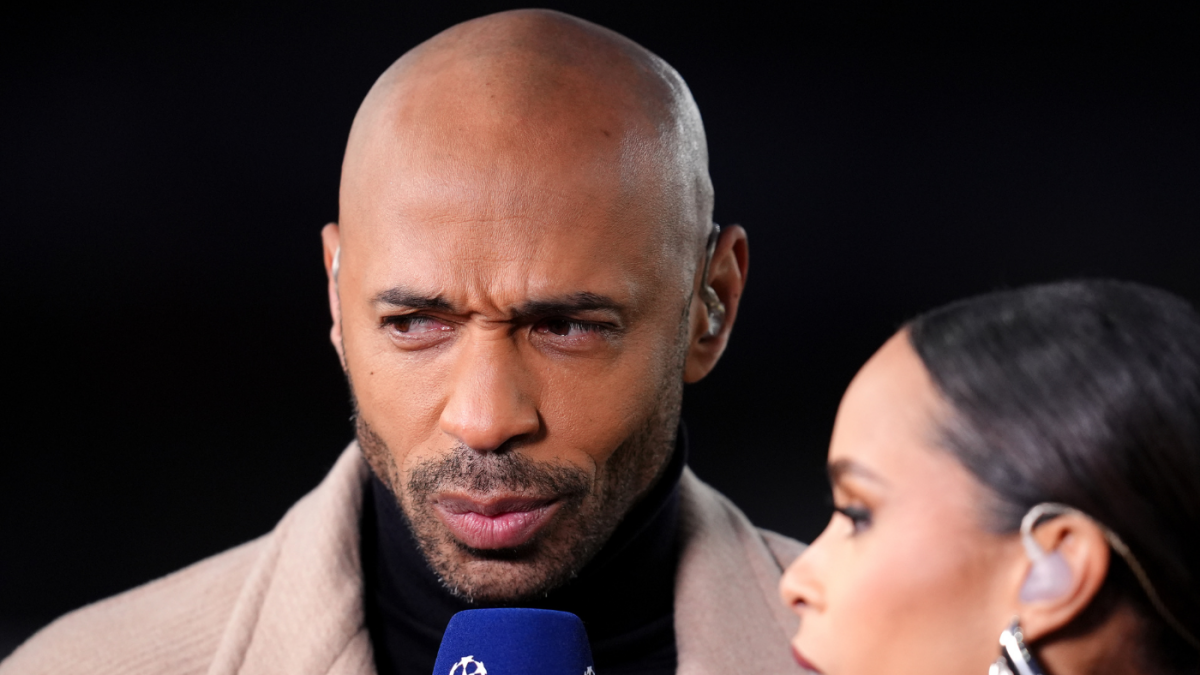Thierry Henry’s Critique: A Path Forward for Arsenal
The Current State of Affairs
In the high-stakes world of football, few voices carry as much weight as that of Thierry Henry. His candid assessment of Arsenal’s performance against Paris Saint-Germain (PSG) has ignited a crucial conversation about the team’s trajectory and potential enhancements. The former Arsenal legend, renowned for his astute analysis, has pinpointed several critical areas where the Gunners must evolve to compete in the Champions League semi-final and beyond.
The recent Champions League semi-final first leg saw PSG secure a narrow 1-0 victory over Arsenal at the Emirates Stadium. Henry’s post-match analysis was blunt: “PSG were much superior, for me, in this match.” This stark evaluation goes beyond the score, delving into the fundamental issues that need addressing. Henry’s critique is not about pointing fingers but about illuminating the path to improvement.
Defensive Frailties
One of the most pressing issues Henry highlighted was Arsenal’s defense. The Gunners’ backline has been a concern throughout the season, and the PSG match was a stark reminder of their vulnerabilities. Henry’s critique of Arsenal’s defense is consistent; it has been a recurring theme in his punditry. The team’s inability to keep a clean sheet against a top-tier opponent like PSG underscores the urgent need for defensive reinforcements and tactical adjustments.
Arsenal’s defensive struggles are not just about individual errors but about a systemic issue that needs a comprehensive solution. This could involve bringing in experienced defenders, improving communication and coordination among the backline, and implementing more robust defensive strategies. The defense is the first line of attack in football, and strengthening it is crucial for Arsenal’s success.
Tactical Adjustments
Henry’s call for change extends beyond individual performances to tactical adjustments. Arsenal’s approach to the game against PSG was criticized for being too predictable. Henry suggested that the team needs to be more dynamic and unpredictable to catch opponents off guard. This could involve changes in formation, player roles, and in-game strategies.
Tactical flexibility is key in modern football. Teams that can adapt their tactics mid-game often have the upper hand. Arsenal needs to be more versatile, capable of switching between defensive solidity and attacking flair seamlessly. This requires a deep understanding of the game and the ability to read the opponent’s tactics and adjust accordingly.
Midfield Dominance
Another critical area Henry touched upon was midfield control. PSG’s midfield outclassed Arsenal, dictating the tempo and flow of the game. For Arsenal to compete at the highest level, they need a midfield that can dominate possession, create chances, and provide defensive cover. This might require reinforcing the midfield with players who can bring a blend of creativity, tenacity, and tactical awareness.
The midfield is the engine room of a football team. It drives the team forward, provides the necessary defensive cover, and creates the chances that lead to goals. Arsenal’s midfield needs to be a powerhouse, capable of controlling the game from the center of the park. This could involve bringing in new talent, improving the existing players’ skills, and implementing more effective midfield strategies.
Mental Resilience
Henry also emphasized the importance of mental resilience. Arsenal has shown moments of brilliance but often falters under pressure. Building mental toughness is crucial for a team aiming to compete in high-stakes matches. This involves not just individual players but the collective mindset of the team, which can be fostered through rigorous training, positive reinforcement, and a supportive team culture.
Mental resilience is as important as physical fitness in football. Teams that can maintain their composure under pressure often come out on top. Arsenal needs to build a team culture that values mental toughness, where players support each other and bounce back from setbacks. This could involve working with sports psychologists, implementing mental training programs, and fostering a positive team environment.
The Road Ahead
Despite the harsh criticism, Henry believes the tie is far from over. He has expressed confidence in Arsenal’s ability to turn things around in the second leg. However, this will require a complete overhaul in approach and performance. The Gunners need to learn from their mistakes, address their weaknesses, and come back stronger.
The second leg against PSG will be a crucial test of Arsenal’s resolve and determination. It will be an opportunity for the team to prove that they can learn from their mistakes and come back stronger. This will require a collective effort from the players, the coaching staff, and the management. They need to work together, address the issues highlighted by Henry, and come up with a plan to turn things around.
Conclusion: A Call to Action
Henry’s critique of Arsenal is not just about pointing out flaws but about providing a roadmap for improvement. The Gunners have the talent and potential to compete with the best, but they need to make significant changes. From bolstering the defense to enhancing midfield control and building mental resilience, the path forward is clear. The future is not set in stone; it is in the hands of the players, the coaching staff, and the management to shape it according to the vision of greatness.
Arsenal stands at a crossroads. They can choose to learn from their mistakes, address their weaknesses, and come back stronger. Or they can choose to ignore the criticism and continue on the same path. The choice is theirs, but the time for action is now. The second leg against PSG will be a crucial test of their resolve and determination. If they can heed Henry’s advice and make the necessary changes, they stand a chance not just of progressing in the Champions League but of becoming a formidable force in European football. The future is bright, but it requires hard work, dedication, and a collective effort from everyone involved. The time to act is now.

